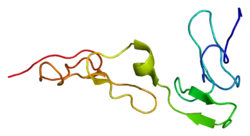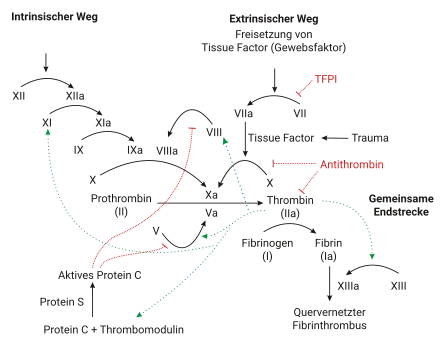Protein S
Das Protein S (S für Seattle) ist ein Vitamin-K-abhängiges Plasma-Glykoprotein, welches in der Leber gebildet wird. Es wirkt der Entstehung von Blutgerinnseln (Thromben) entgegen[1] und steigert zudem deren Auflösung (Fibrinolyse).[2]
| Protein S | ||
|---|---|---|
 | ||
|
Vorhandene Strukturdaten: 1z6c | ||
| Eigenschaften des menschlichen Proteins | ||
| Masse/Länge Primärstruktur | 635 Aminosäuren; 70,6 kDa | |
| Bezeichner | ||
| Gen-Namen | PROS1 ; PROS | |
| Externe IDs | ||
| Vorkommen | ||
| Übergeordnetes Taxon | Euteleostomi | |
| Orthologe | ||
| Mensch | Maus | |
| Entrez | 5627 | 19128 |
| Ensembl | ENSG00000184500 | ENSMUSG00000022912 |
| UniProt | P07225 | Q3TR66 |
| Refseq (mRNA) | NM_000313 | NM_011173 |
| Refseq (Protein) | NP_000304 | NP_035303 |
| Genlocus | Chr 3: 95.07 – 95.18 Mb | Chr 16: 62.8 – 62.87 Mb |
| PubMed-Suche | 5627 | 19128 |
Biochemie
Protein S ist eine Plasma-Serin-Protease[3], welche beim Menschen in den Leberzellen gebildet wird. Dieser Vorgang ist Vitamin-K-abhängig[2]. Das Protein S wirkt als Kofaktor von Protein C, welches die Gerinnungsfaktoren Va, sowie VIIIa inaktiviert und abbaut. Dies bremst das Ablaufen der normalen Blutgerinnung.
Des Weiteren unterstützt Protein S die Phagozytose von apoptotischen Zellen[4] und spielt auch eine Rolle beim Ablauf von Entzündungsvorgängen[3].
Etwa 60 % des im menschlichen Blutplasmas vorkommenden Protein S liegt gebunden an das "C4b bindende Protein" (C4BP) vor[4].

Pathobiochemie
Ein Protein-S-Mangel kann dementsprechend zu Thrombosen führen. Ein heterozygoter Gendefekt führt dabei zu einem erhöhten Risiko, eine venöse Thrombose zu erleiden. Ein homozygoter Gendefekt ist nicht mit dem Leben vereinbar, betroffene Patienten erleiden bereits während der Fetalperiode ernste Thrombosen oder leiden unter Störungen der Entwicklung des Gefäßsystems.[4]
Literatur
- A. Lundwall, W. Dackowski, E. Cohen, M. Shaffer, A. Mahr, B. Dahlbäck, J. Stenflo, R. Wydro: Isolation and sequence of the cDNA for human protein S, a regulator of blood coagulation. In: Proc. Natl. Acad. Sci. U.S.A. 83 (18), Sept. 1986, S. 6716–6720. doi:10.1073/pnas.83.18.6716. PMC 386580 (freier Volltext). PMID 2944113.
- G. L. Long, A. Marshall, J. C. Gardner, S. L. Naylor: Genes for human vitamin K-dependent plasma proteins C and S are located on chromosomes 2 and 3, respectively. In: Somat. Cell Mol. Genet. 14 (1), Jan 1988, S. 93–98. doi:10.1007/BF01535052. PMID 2829367.
- E. Castoldi, T. M. Hackeng: Regulation of coagulation by protein S. In: Curr. Opin. Hematol. 15 (5), Sept. 2008, S. 529–536. doi:10.1097/MOH.0b013e328309ec97. PMID 18695379.
- Eckhard Podack, William Kolb, Hans Müller-Eberhard: The SC5b-7 complex: formation, isolation, properties, and subunit composition. In: J. Immunol. 199, 1977, S. 2024–2029. PMID 410885.
- N. J. Beauchamp, A. C. Dykes, N. Parikh, R. Campbell Tait, M. E. Daly: The prevalence of, and molecular defects underlying, inherited protein S deficiency in the general population. In: Br. J. Haematol. 125 (5), Jun 2004, S. 647–654. doi:10.1111/j.1365-2141.2004.04961.x. PMID 15147381.
- P. García de Frutos, P. Fuentes-Prior, B. Hurtado, N. Sala: Molecular basis of protein S deficiency. In: Thromb. Haemost. 98 (3), Sept. 2007, S. 543–556. doi:10.1160/th07-03-0199. PMID 17849042.
- M. J. Heeb, Y. Kojima, J. Rosing, G. Tans, J. H. Griffin: C-terminal residues 621-635 of protein S are essential for binding to factor Va. In: J. Biol. Chem. (UNITED STATES) 274 (51), Dez 1999, S. 36187–36192. doi:10.1074/jbc.274.51.36187. PMID 10593904.
- M. J. Heeb, R. M. Mesters, G. Tans, J. Rosing, J. H. Griffin: Binding of protein S to factor Va associated with inhibition of prothrombinase that is independent of activated protein C. In: J. Biol. Chem. (UNITED STATES) 268 (4), Feb 1993, S. 2872–2877. PMID 8428962.
Einzelnachweise
- Biochemie. 4. Auflage. Georg Thieme Verlag, Stuttgart 2016, ISBN 978-3-13-125354-5, Hemmung der Blutgerinnung, doi:10.1055/b-003-129341 (thieme.de [abgerufen am 26. Oktober 2020]).
- DocCheck Medical Services GmbH: Protein S. Abgerufen am 26. Oktober 2020.
- Ashish Gupta, Aung M. Tun, Kush Gupta, Faiz Tuma: Protein S Deficiency. In: StatPearls. StatPearls Publishing, Treasure Island (FL) 2020, PMID 31335064 (nih.gov [abgerufen am 26. Oktober 2020]).
- Björn Dahlbäck: Vitamin K–Dependent Protein S: Beyond the Protein C Pathway. In: Seminars in Thrombosis and Hemostasis. Band 44, Nr. 02, März 2018, ISSN 0094-6176, S. 176–184, doi:10.1055/s-0037-1604092 (thieme-connect.de [abgerufen am 26. Oktober 2020]).